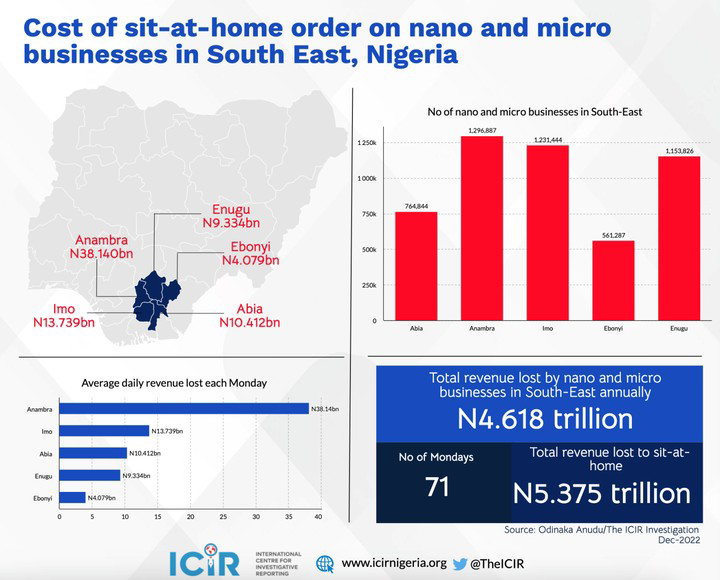FOR many residents of South-East Nigeria, Monday is part of the weekend. Banks, shops, transport companies, churches, schools and government offices are under lock and key.
For 52 Mondays in a year, revenues and profits do not matter. Jobs and contracts are of no significance. What matters is what the people hold dear: freedom.
The South-East zone is made up of five states: Anambra, Enugu, Imo, Abia and Ebonyi. It is the only region with five states in Nigeria, with the other five zones having six, except North-West region that has seven.
On August 22, 2022, a bright Monday morning, The ICIR reporter was in Onitsha, the commercial nerve centre of the South-East Nigeria, to witness the much-discussed sit-at-home exercise.
On that sunny Monday morning, markets were all closed. The streets were turned into football fields. It was another day for roadwork – and everybody was allowed to keep fit.
The pubs were full as early as 10 am with boisterous men exchanging banters over bottles of beer.
It was a rowdy session at a taproom close to Urban Girls Secondary School, Fegge, Onitsha.
The reporter sat there, trying to feel the pulse of the people. “Are you happy with this sit-at-home exercise?” the reporter asked a man sitting close to him.
It was a simple question meant for an acquaintance, but eavesdroppers hijacked the discussion and turned it into a row.
A man in his early 40s responded, “Are you also one of the saboteurs?”
The reporter answered in the negative. The atmosphere was getting tense, and tempers could flare.
After feeling reassured that the reporter was not a saboteur, the man said, “This present government of Muhammadu Buhari is responsible for this sit-at-home. We will continue to sit at home every Monday until he releases our leader, Mazi Nnamdi Kanu.”
Almost everybody in the pub responded with a nod. But a fellow, who obviously belonged to a different school of thought asked, “How does this sit-at-home exercise affect Buhari?”
A man in his 40s, whom the reporter later understood to be Chima, said it did not matter.
“We are fighting for our freedom. We will continue to shut down our region every Monday until the Federal government releases our leader,” he retorted.
A major point in the sit-at-home exercise is that Chima and others who cheered him were taking its financial implications for granted.
How it all began
The ICIR ventured into an estimation of what the region could be losing from its citizens sitting at home every Monday by looking at losses borne by businesses known as nano/homestead and micro enterprises.
Nano or homestead enterprises have one to two workers and make an annual turnover of less than N3 million. Micro businesses, on the other hand, have three to nine staff members and an annual turnover of N3 million to N25 million, according to the Small and Medium Enterprises Development Agency of Nigeria (SMEDAN) and the National Bureau of Statistics.
Micro and nano businesses were considered because they make up 99.8 per cent of MSMEs in Nigeria, according to a 2017 SMEDAN report.
Before the investigation officially commenced in August 2022, the reporter had been interacting with businesses in the region, especially micro-enterprises, since January 2022, trying to understand how the sit-at-home exercise affected them and how much they were losing in financial terms from the exercise.
A total of 22 micro businesses were interviewed in each of the five states of the South-East region. They were asked to estimate, based on their financial records, how much they earned in revenue every Monday before the sit-at-home began.
Some micro-business owners refused to disclose their income levels. A few of them even avoided the reporter completely.
However, a sizeable number of them later cooperated freely.
Visited locations
In Anambra State, micro and nano business owners, ranging from petty traders dealing in clothes at the Main Market in Onitsha to kiosk operators at Eke Ekwulobia, were interviewed.




